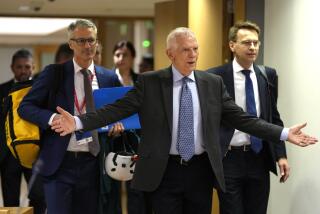EC to Send Milk, Meat to Russian Markets : Food aid: European supplies worth $266 million could bring down prices in Moscow and Leningrad.
- Share via
MOSCOW — The European Community has launched a food aid plan so ambitious that it could help foster market-based systems in Russia’s two largest cities, the community’s representative in Moscow said Wednesday.
In the next two months, the EC will provide 150,000 tons of meat, butter and dried milk to Moscow and St. Petersburg worth $266 million or so, Michael Emerson, the community’s official in Moscow, said at a press conference, adding: “This is an economic policy action in support of the reform action of the Russian government.”
The food will be sold at prices that city officials helped determine. The proceeds will go to help “those hardest hit” by the shock therapy that Russian President Boris N. Yeltsin has prescribed for his country’s economy, Emerson said.
In a bold attempt to save the Russian economy, Yeltsin lifted price controls on most food items and other consumer goods three weeks ago. Prices on many staples have increased 10 times or more since then. But the economy was in such bad shape that there are still shortages of most goods. The EC hopes that its aid will help relieve the acute shortages of meat, milk and butter while stabilizing prices on these items.
“We are attracted to selling these products, because it is also part of the market reform process,” Emerson said. “If we were just giving the stuff away, this would be very nice for the recipients, but it would not be helping make the market system be more efficient and more equitable.”
Because the aid is coming in vast quantities, Emerson said, it could work to satisfy the market, which would bring down prices on meat, milk and butter and give steam to Yeltsin’s reforms. The daily supply of EC meat to Moscow’s stores, for instance, will be equivalent to one-third of the demand for meat before prices skyrocketed. The current demand for meat is considerably lower but is still difficult to quantify.
Moscow officials were enthusiastic about the promise of so much high-quality food pouring into their otherwise poorly stocked stores. But they were a bit more cautious than Emerson. “Of course the aim (that has been) set--to fill our shelves and our market--is wonderful,” said Tatiana S. Andrianova, a commercial trade specialist on Moscow’s Humanitarian Aid Commission. “But you surely know . . . it is a task of tremendous dimensions.”
Whether it fills the stores or not, however, the aid program will help Russia’s largest cities at a very crucial period, she said: “This aid plan will definitely help promote Yeltsin’s reforms. This assessment is justified by the volume of what is being sent to us. I can’t help feeling impressed and overwhelmed by the sheer size of it.”
Emerson said the EC has taken pains to ensure that its aid will not suffer from the misuse of previous humanitarian food shipments, which have ended up in the hands of black marketeers.
“We are putting together a serious team of people that will be closely monitoring every phase of our operation,” Emerson said. “If we see that our goods are not being handled in the correct way, we will raise the issues with the appropriate authorities.”
But the Moscow official said that some loss is inevitable. “We will do our best to tightly control the distribution and selling of the aid,” Andrianova said. “The aid will be heavily guarded. But as for the possibility of it being siphoned off in the shops, I will tell you my personal opinion. Of course it is impossible to hold every sales person by the hand. It largely depends on honesty. . . . Unfortunately, every flock has a black sheep.”
Andrianova praised the idea to sell the aid and use the profits to supplement the income of the cities’ poorest residents. By giving them money rather than food, they can decide for themselves what they need most, which may not be meat or butter but, perhaps, medicine.
More to Read
Sign up for Essential California
The most important California stories and recommendations in your inbox every morning.
You may occasionally receive promotional content from the Los Angeles Times.













